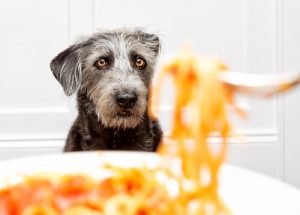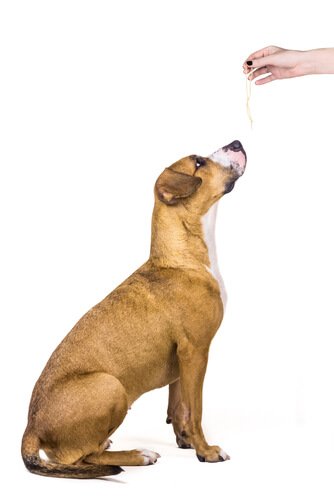Can Dogs Eat Pasta?


Written and verified by the lawyer Francisco María García
Pasta is a very common food all over the world. A lot of dog owners wonder if their dogs can eat pasta if it’s healthy or not. The answer is that eating pasta isn’t poisonous or damaging to dogs as long as they don’t have a liver disease.
Even though pasta isn’t a food that you should add to your dog’s normal diet because it can have negative effects in the long run. Nutritionally, there really isn’t any huge benefits. However, sharing a pasta dish with your dog from time to time isn’t dangerous.
Pasta: high in carbohydrates
Looking at the nutritional composition of pasta, it’s generally a food made with water, flour, and sometimes eggs. This means that pasta is high in carbohydrates.
When it comes to providing your dog a proper diet, you shouldn’t use carbohydrates as a main source of energy. This is because they cause your pet to gain weight and cause nutritional deficiencies. Carbohydrates don’t have any nutritional value.
Is eating pasta a nutritional requirement for your dog’s diet?
No, eating pasta isn’t an essential part of your pet’s diet. A dog’s nutritional requirements are based on eating proteins, fats, vitamins, minerals, and other things. So, it’s important to consider that their main energy source is protein.
That being said, if you want to add pasta to your dog’s diet, you can do so as long as you don’t do it every day. It shouldn’t become the basis of their diet.

Also, it’s recommended not to mix pasta with processed foods in order to prevent intestinal issues. This is due to the fact that each food has a different digestive process and they affect each dog differently.
How to add pasta to your dog’s food.
Usually, homemade diets for dogs are primarily based on protein and vegetables. This doesn’t mean you can’t add a serving of pasta to your dog’s meal every once in a while. Therefore, if you decide to feed your dog pasta, it’s important to know how to add it to your their diet.
Before giving any pasta to your canine friend, it’s a good idea to take a look at its ingredients. You should look at the preparation directions. Likewise, you should be aware of which pasta has certain kinds of wheats or cereals like: oat, barley, whole wheat, rice flour, and flax. These are the best grains for your dog and they will make it easier for your them to digest their food.
Once again, don’t forget that pasta shouldn’t be the basis of your dog’s diet because it’s important to incorporate other foods, like fish, meat, or eggs. You can also add a small amount of vegetables.
On the other hand, always avoid using salt and all other foods your pet shouldn’t eat because they could poison your dog.

Symptoms of bad digestion
After eating pasta, your dog might show some symptoms of bad digestion. These symptoms can indicate that your pet has an intolerance to a food that you gave them. Some of these signs can be vomiting, diarrhea, digestive problems, gas, malaise, and bloating.
It’s important that you don’t add any kind of sauce to your pet’s food. They can cause digestive problems and even be toxic to your dog.
Some breeds that shouldn’t eat pasta
There are some breeds that have a stronger predisposition to gain weight. Therefore, they should not eat pasta or foods made from it. Some of these breeds are Labradors, Beagles, Dachshunds, Boxers, English Bulldogs, Rough Collies, Pugs, and Basset Hounds.
Other dogs that shouldn’t eat pasta are dogs that are old, sterilized, sedentary, and brachycephalic breeds.
Pasta is incredibly rich in energy. As a result, if it isn’t burned, it usually turns into fat which causes weight gain. It’s very important to your dog’s health to avoid them from becoming obese. Don’t forget that being overweight causes health problems and diseases like arthritis and hip dysplasia.
Pasta is a very common food all over the world. A lot of dog owners wonder if their dogs can eat pasta if it’s healthy or not. The answer is that eating pasta isn’t poisonous or damaging to dogs as long as they don’t have a liver disease.
Even though pasta isn’t a food that you should add to your dog’s normal diet because it can have negative effects in the long run. Nutritionally, there really isn’t any huge benefits. However, sharing a pasta dish with your dog from time to time isn’t dangerous.
Pasta: high in carbohydrates
Looking at the nutritional composition of pasta, it’s generally a food made with water, flour, and sometimes eggs. This means that pasta is high in carbohydrates.
When it comes to providing your dog a proper diet, you shouldn’t use carbohydrates as a main source of energy. This is because they cause your pet to gain weight and cause nutritional deficiencies. Carbohydrates don’t have any nutritional value.
Is eating pasta a nutritional requirement for your dog’s diet?
No, eating pasta isn’t an essential part of your pet’s diet. A dog’s nutritional requirements are based on eating proteins, fats, vitamins, minerals, and other things. So, it’s important to consider that their main energy source is protein.
That being said, if you want to add pasta to your dog’s diet, you can do so as long as you don’t do it every day. It shouldn’t become the basis of their diet.

Also, it’s recommended not to mix pasta with processed foods in order to prevent intestinal issues. This is due to the fact that each food has a different digestive process and they affect each dog differently.
How to add pasta to your dog’s food.
Usually, homemade diets for dogs are primarily based on protein and vegetables. This doesn’t mean you can’t add a serving of pasta to your dog’s meal every once in a while. Therefore, if you decide to feed your dog pasta, it’s important to know how to add it to your their diet.
Before giving any pasta to your canine friend, it’s a good idea to take a look at its ingredients. You should look at the preparation directions. Likewise, you should be aware of which pasta has certain kinds of wheats or cereals like: oat, barley, whole wheat, rice flour, and flax. These are the best grains for your dog and they will make it easier for your them to digest their food.
Once again, don’t forget that pasta shouldn’t be the basis of your dog’s diet because it’s important to incorporate other foods, like fish, meat, or eggs. You can also add a small amount of vegetables.
On the other hand, always avoid using salt and all other foods your pet shouldn’t eat because they could poison your dog.

Symptoms of bad digestion
After eating pasta, your dog might show some symptoms of bad digestion. These symptoms can indicate that your pet has an intolerance to a food that you gave them. Some of these signs can be vomiting, diarrhea, digestive problems, gas, malaise, and bloating.
It’s important that you don’t add any kind of sauce to your pet’s food. They can cause digestive problems and even be toxic to your dog.
Some breeds that shouldn’t eat pasta
There are some breeds that have a stronger predisposition to gain weight. Therefore, they should not eat pasta or foods made from it. Some of these breeds are Labradors, Beagles, Dachshunds, Boxers, English Bulldogs, Rough Collies, Pugs, and Basset Hounds.
Other dogs that shouldn’t eat pasta are dogs that are old, sterilized, sedentary, and brachycephalic breeds.
Pasta is incredibly rich in energy. As a result, if it isn’t burned, it usually turns into fat which causes weight gain. It’s very important to your dog’s health to avoid them from becoming obese. Don’t forget that being overweight causes health problems and diseases like arthritis and hip dysplasia.
This text is provided for informational purposes only and does not replace consultation with a professional. If in doubt, consult your specialist.








